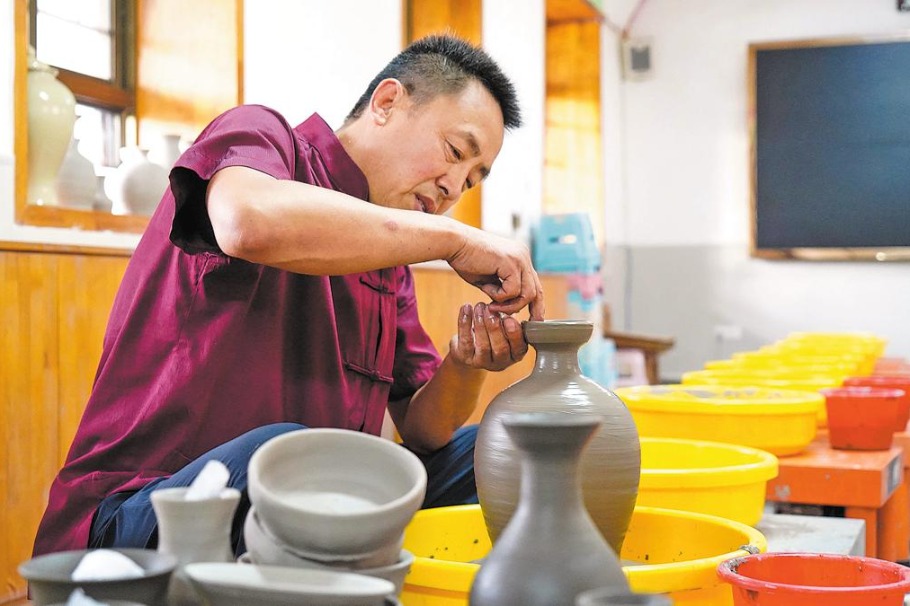Zooming in on a 'tall order'


Despite the individual discrepancies, the scourge is generally an "amplifier of problems" that the special-needs group had to contend with before the pandemic, Boddison said.
Beverley Graham, a UK-based educational psychologist, said that even without COVID-19, children with social, emotional and mental health (SEMH) needs are more likely to be excluded permanently from school, partly because schools can find it hard to achieve consistency in their management and teaching. "You've a lot of teaching stuff, so trying to be consistent is quite difficult. It requires a lot of organization."
And that pattern seems to continue as schools are reopening. Since children with SEMH needs may not be resilient enough to recover from the disrupted lifestyle, they're more likely to be suspended from school shortly after they come back from home schooling, Graham said. "So they're not fully integrated back in school. They're not getting a full-time education."
"For those already with the problem of fitting in, feeling isolated and demotivated, the sudden access to nothing aggravates the loneliness and dampens their motivation further," Boddison said.
Struggling parents
He said it's a steep learning curve not only for special-needs children, but their parents as well.
For parents, it's an unprecedentedly taxing time as they need to wear many hats on a daily basis — mom or dad, caregiver, teacher and counselor. Without the know-how to steer their special-needs children through such a trying time and gain access to professional support services, which were or remain halted, parents feel drained physically and emotionally, Boddison said.
During normal school days, parents get a respite when their special-needs children are cared for by teachers and therapists, he said. But this treasured relief vanished during the lockdown. "As a result, stress built up (in parents), their tolerance threshold came down, they got annoyed by trivial matters. These were all bad for their own well-being. They were likely to feel isolated as their usual social network of meeting other parents vanished," Graham said.
Despite the pandemic's sheer pernicious impact on special-needs youngsters, it could be harnessed by parents as an opportunity to be better informed and acquainted with the approaches that online speech therapists use to help their children, Boddison added.
Daisy Yew, a social worker at the Boys' and Girls' Clubs Association of Hong Kong, saw for herself the hardships of special-needs children and their families. Conflicts between children and their caregivers were more commonly seen in ADHD cases, she said, mainly because this cohort is characteristic with low adaptive capacities and high impulsivity activated by over stress and frustration.
"Many autistic children have an impression embedded in their subconsciousness that 'studies take place only in school, with bags packed, with teachers and classrooms around'. In other words, not going to school, to them, means no studies. That's to say, they have difficulty associating the home with schooling," Yew said. "Reduced social engagement could diminish their social skills acquired before the onset of the pandemic, which is considerably deleterious to them."
According to Yew, the association adopted an "appointment-only" service format as COVID-19 raged, to restrict the number of visitors. That meant that not all children and parents in need could get timely support. "We had to give priority to those in a dire situation, such as children of single parents, parents who don't know how to help their children, and those at a socioeconomic disadvantage."
The association has also set up online workshops to help parents overcome the problems of homeschooling, and offered relaxation sessions for them to de-stress themselves through meditation. But this is far from enough, Yew said. "With more funding and extra manpower resources, we can reach out to more caregivers (of children with special needs) with more generous, compassionate and practical support."
Nothing is more relevant than helping the caregivers maintain a sound and positive mental state, she said.
Simpson Wong Wai-lap, an associate professor at Hong Kong Baptist University, who conducts research into specific learning difficulties, favors a "train the trainer" model, in which specialist teachers and therapists mentor university students slated to work in the special education field. The students, in turn, provide training for parents to iron out problems with their children. This is a sustainable solution to the overriding issue, he said. "Too many parents out there are desperate for specialist advice, while the limited number of specialists at work feel completely stretched."
Wong said he's relieved to see many local schools going to great lengths to ease parents and children into the new routines.
"With more funding and support, schoolteachers can hire qualified assistants, such as part-time social workers, counselors, teaching assistants and special educational needs coordinators, to alleviate the heavy burden."
- 8 dead in fatal Jiangxi car accident
- Xinjiang to introduce football classes across all schools
- Lai Ching-te criticized for selling out Taiwan's competitive industries
- Chinese legislators urged to faithfully perform statutory duties
- Fog provides rare, tranquil view of animals at Chongqing zoo
- Mainland police seek information on 2 suspected Taiwan smugglers




































